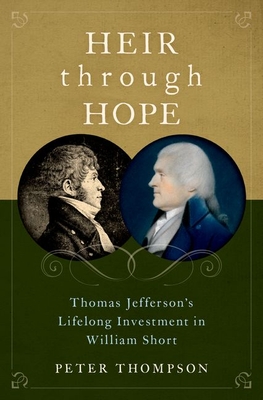Heir Through Hope: Thomas Jefferson's Lifelong Investment in William Short

Heir Through Hope: Thomas Jefferson's Lifelong Investment in William Short
collaborator, and never became a neighbor, yet the elder man invested considerable emotional energy and time in his "adoptive son," even during his vice-presidency and presidency. By efficiently managing the younger man's financial affairs Jefferson enabled his extended stay in France, but also diverted Short's money for his own use. Although he believed Short's political judgment had been clouded by his enjoyment of French society and savagely criticized his reaction to the French Revolution, he never gave up on Short the private individual. Heir through Hope reveals a figure who served as a unique sounding board to a Founder, while underscoring the distinct ways Jefferson envisioned the United States' destiny vis à vis Europe. Fascinating in its own right, their complex relationship highlights the tensions between the founding generation and its successors while illuminating the operation of political power in early national America and Revolutionary Europe.
PRP: 230.30 Lei
Acesta este Prețul Recomandat de Producător. Prețul de vânzare al produsului este afișat mai jos.
184.24Lei
184.24Lei
230.30 LeiLivrare in 2-4 saptamani
Descrierea produsului
collaborator, and never became a neighbor, yet the elder man invested considerable emotional energy and time in his "adoptive son," even during his vice-presidency and presidency. By efficiently managing the younger man's financial affairs Jefferson enabled his extended stay in France, but also diverted Short's money for his own use. Although he believed Short's political judgment had been clouded by his enjoyment of French society and savagely criticized his reaction to the French Revolution, he never gave up on Short the private individual. Heir through Hope reveals a figure who served as a unique sounding board to a Founder, while underscoring the distinct ways Jefferson envisioned the United States' destiny vis à vis Europe. Fascinating in its own right, their complex relationship highlights the tensions between the founding generation and its successors while illuminating the operation of political power in early national America and Revolutionary Europe.
Detaliile produsului









